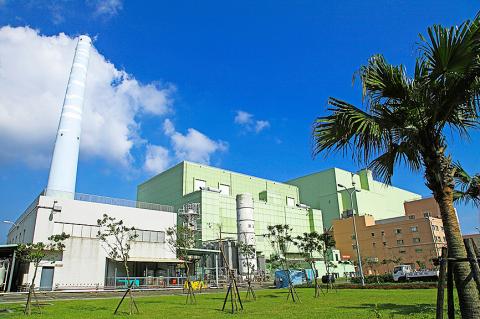State-run Taiwan Power Co (Taipower, 台電) yesterday reiterated that it has a three-year plan to deal with the 1,744 unused fuel rods at the mothballed Fourth Nuclear Power Plant, but declined to comment on reports that it has begun shipping the rods back to the US supplier.
The Chinese-language United Daily News yesterday reported that Taipower early yesterday shipped 80 unused fuel rods from Keelung port and is to send another 120 rods in September, as part of its plan to completely shut down the plant — also known as the Longmen Nuclear Power Plant — in New Taipei City’s Gongliao District (貢寮).
The US supplier, Global Nuclear Fuel Americas LLC, is responsible for dismantling and storing the rods, the report said.

Photo courtesy of Taiwan Power Co
Citing a nondisclosure agreement, Taipower spokesman Hsu Tsao-hua (徐造華) said he could not respond to questions on whether the rods have been shipped.
However, he said that all 1,744 fuel rods are slated to be sent back to the US by the end of 2020 in eight installments.
“The whole process — including shipping, dismantling and storing the rods — would cost the government nearly NT$690 million [US$22.62 million],” Hsu said by telephone.
However, removing the 1,744 rods from the plant could save the government about NT$140 million in annual maintenance costs, he told the Taipei Times, adding that the US supplier would store the rods until 2022 based on the contract.
“We are more likely to sell the unused fuel rods to foreign buyers earlier if we send them back to the US as soon as possible,” Hsu said.
In the worst-case scenario, Taipower would consider selling the uranium inside the rods to maximize asset utilization if no suitable buyers could be found, it said.
The plant has been sealed since 2014 because of public concerns and strong opposition to its operation.
Taipower is considering transforming the idle plant into a facility with multiple power generation sources as part of the government’s nuclear-free homeland policy.
Several local business leaders urged the government to consider reactivating idle or suspended nuclear power plants amid concern over a potential power shortage after the nation’s power consumption hit record high levels in May and last month.

DAREDEVIL: Honnold said it had always been a dream of his to climb Taipei 101, while a Netflix producer said the skyscraper was ‘a real icon of this country’ US climber Alex Honnold yesterday took on Taiwan’s tallest building, becoming the first person to scale Taipei 101 without a rope, harness or safety net. Hundreds of spectators gathered at the base of the 101-story skyscraper to watch Honnold, 40, embark on his daredevil feat, which was also broadcast live on Netflix. Dressed in a red T-shirt and yellow custom-made climbing shoes, Honnold swiftly moved up the southeast face of the glass and steel building. At one point, he stepped onto a platform midway up to wave down at fans and onlookers who were taking photos. People watching from inside

A Vietnamese migrant worker yesterday won NT$12 million (US$379,627) on a Lunar New Year scratch card in Kaohsiung as part of Taiwan Lottery Co’s (台灣彩券) “NT$12 Million Grand Fortune” (1200萬大吉利) game. The man was the first top-prize winner of the new game launched on Jan. 6 to mark the Lunar New Year. Three Vietnamese migrant workers visited a Taiwan Lottery shop on Xinyue Street in Kaohsiung’s Gangshan District (崗山), a store representative said. The player bought multiple tickets and, after winning nothing, held the final lottery ticket in one hand and rubbed the store’s statue of the Maitreya Buddha’s belly with the other,

‘NATO-PLUS’: ‘Our strategic partners in the Indo-Pacific are facing increasing aggression by the Chinese Communist Party,’ US Representative Rob Wittman said The US House of Representatives on Monday released its version of the Consolidated Appropriations Act, which includes US$1.15 billion to support security cooperation with Taiwan. The omnibus act, covering US$1.2 trillion of spending, allocates US$1 billion for the Taiwan Security Cooperation Initiative, as well as US$150 million for the replacement of defense articles and reimbursement of defense services provided to Taiwan. The fund allocations were based on the US National Defense Authorization Act for fiscal 2026 that was passed by the US Congress last month and authorized up to US$1 billion to the US Defense Security Cooperation Agency in support of the

HIGH-TECH DEAL: Chipmakers that expand in the US would be able to import up to 2.5 times their new capacity with no extra tariffs during an approved construction period Taiwan aims to build a “democratic” high-tech supply chain with the US and form a strategic artificial intelligence (AI) partnership under the new tariffs deal it sealed with Washington last week, Taipei’s top negotiator in the talks said yesterday. US President Donald Trump has pushed Taiwan, a major producer of semiconductors which runs a large trade surplus with the US, to invest more in the US, specifically in chips that power AI. Under the terms of the long-negotiated deal, chipmakers such as Taiwan Semiconductor Manufacturing Co (TSMC, 台積電) that expand US production would incur a lower tariff on semiconductors or related manufacturing